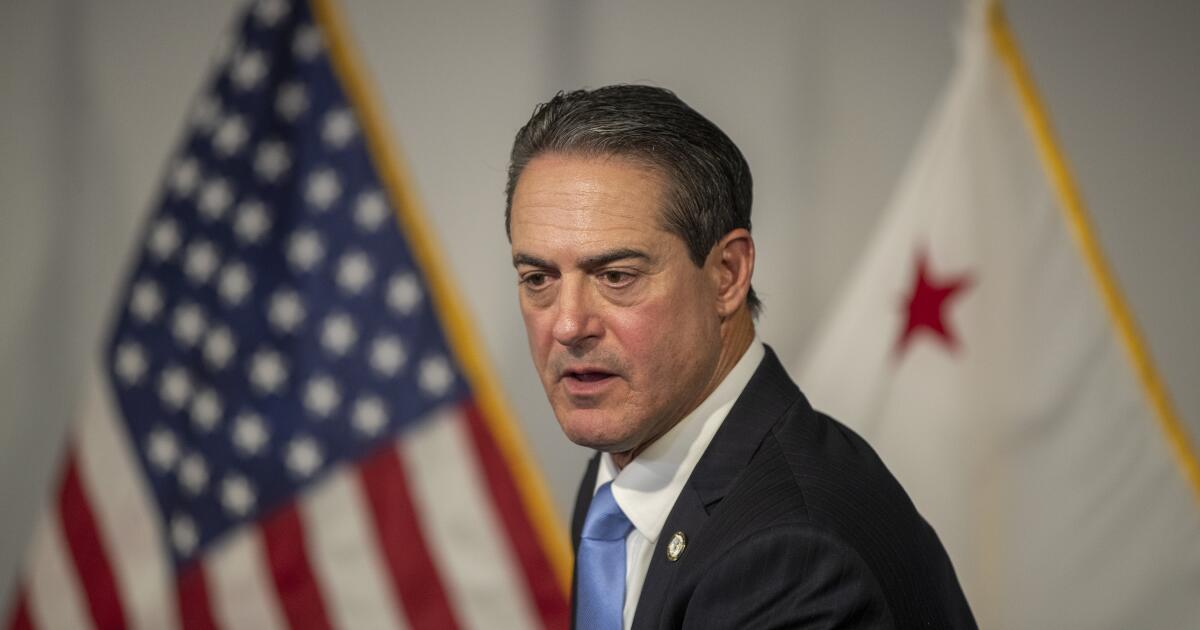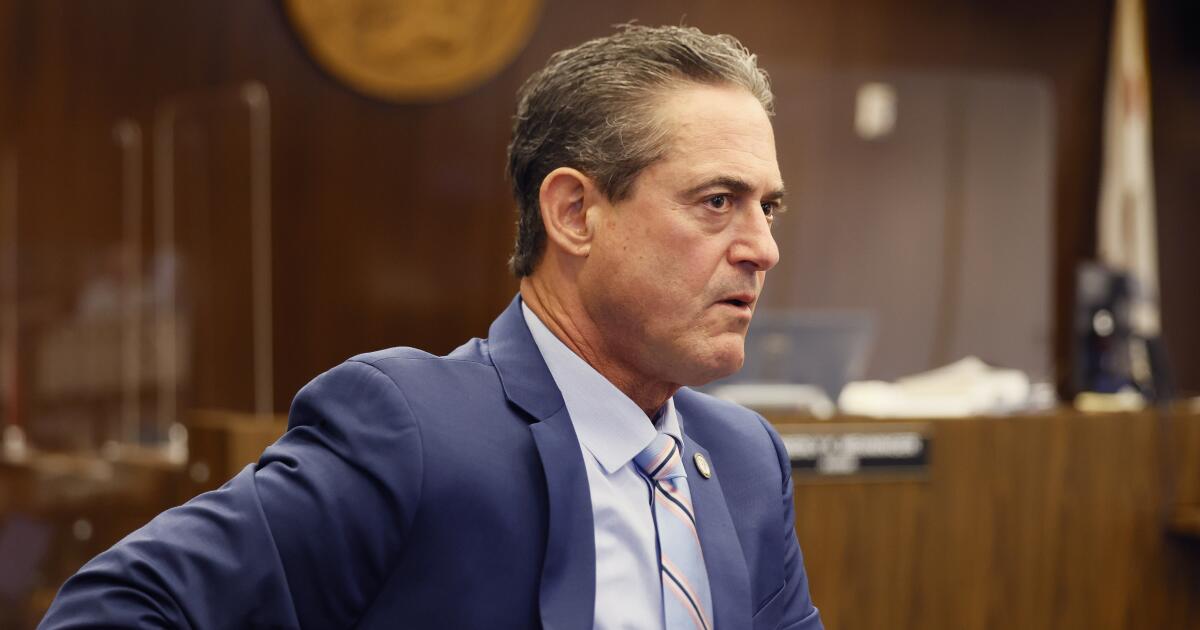Orange County D.A. retaliated against female prosecutor, jury finds
Orange County Dist. Atty. Todd Spitzer harassed and retaliated against a high-ranking female prosecutor in his office after she raised concerns about his conduct and tried to protect other prosecutors who were sexually harassed by another superior, according to a jury verdict Thursday.
The jury, which heard the case in San Diego County to avoid potential conflicts, found Spitzer acted with malice against Tracy Miller, who was at one point the highest-ranking woman in the prosecutor’s office.
The jury also found that the county did not take reasonable steps to prevent workplace harassment, and took “adverse employment action” against Miller.
“Tracy Miller had the fortitude to resist the most powerful law enforcement person in the county, and she prevailed,” John Barnett, Miller’s attorney, said after the verdict was read. “It took a lot of courage, and the jury saw that she was right.”
The county declined to comment on the verdict.
The jury found the county, Spitzer and former Chief Assistant Dist. Atty. Shawn Nelson liable for $3 million in damages, including $1.5 million for past emotional distress.
Late Thursday, the jury also ruled Spitzer would be liable for an additional $25,000 in punitive damages.
In a statement to The Times, Spitzer said he accepted “full responsibility for any and all actions which occur in my administration, including my own actions and the actions of my former Chief Assistant District Attorney Shawn Nelson.”
Spitzer, in the statement, made no mention of the allegations of retaliation or harassment made by Miller in the lawsuit but said he had “set a very high standard which I expected all my employees to meet, and Ms. Miller was overseeing extremely important assignments.”
“It is no secret that there was a lot of frustration on my part with her lack of performance in handling these very serious matters,” Spitzer said in the statement after the jury returned with their verdict. “I respect the jury’s decision, and I am heartbroken over the fact that any of my actions could have been interpreted as anything other than a good faith effort to clean up the public corruption in the Orange County District Attorney’s Office, and to create a work ethic that adheres to what Orange County residents demand of its District Attorney.”
Unlike criminal trials, civil trials in California do not require a unanimous verdict. In this civil case, juror decisions ranged from 12 to 0 to 9 to 3 for the various claims upheld against the defendants. The jury voted 10 to 2 to award punitive damages against Spitzer.
Miller accused Orange County, Spitzer and Nelson of retaliation and forcing Miller out after she objected to Spitzer’s actions while heading the office. Miller alleged she tried to protect female prosecutors from being retaliated against after they alleged they were sexually harassed by Gary LoGalbo, a former supervisor who was also friends with Spitzer.
Former and current prosecutors in the office described a “challenging” and “demanding” environment inside the prosecutors office, but some said they faced threats of being fired or demoted.
In her testimony, Miller said Spitzer and Nelson used “gender-based slurs,” disrespected her and undermined her authority in the office.
According to her suit, Miller alleged she had raised concerns that Spitzer had violated the Racial Justice Act by bringing up questions about race while determining whether to seek the death penalty against a Black defendant, and that Spitzer used race in case assignments.
Miller said in court that Spitzer, in retaliation, had threatened to fire her close friends in the office and dismantle programs she had spearheaded.
But much of the trial centered on what occurred shortly after several female prosecutors alleged they were sexually harassed by LoGalbo, a former police officer and the best man at Spitzer’s wedding.
When an internal county investigation confirmed the women were harassed, the report identified Miller and her testimony by describing her position and gender. Afterward, Miller testified, Spitzer targeted her and criticized her for writing notes during executive meetings.
“You could see anytime a subject came up, Tracy was taking notes about our meetings,” Spitzer testified. “There was a point of time where it was very curious to me, why do you seem to be memorializing everything we’re doing?”
Spitzer, who testified on multiple days during the trial, denied the accusations of harassment and retaliation. He acknowledged deep tensions within the office after he assumed the role in 2018 but attributed the opposition to employees who supported the previous district attorney, Tony Rackauckas.
“I knew it was going to be miserable, and it was miserable,” Spitzer said in testimony, at one point wiping away tears.
He said that was part of the reason he chose Nelson, now a county Superior Court judge, as chief assistant district attorney when he first took office.
“I picked him because I was going into battle, in the lions’ den,” Spitzer said.
But Miller testified Nelson’s actions also raised problems in the district attorney’s office after the allegations of sexual harassment were made. For example, prosecutors testified that during a sexual harassment training session for managers, Nelson stood up and said there were “no victims.”
On Thursday, one of the attorneys representing Miller urged jurors to seek punitive damages against Spitzer, arguing that the acts of retaliation and harassment against Miller were not isolated events.
“This wasn’t just a single incident,” he told jurors. “It wasn’t negligence. This was intentional. It was a long-term, long series of events.”
In his statement Thursday, Spitzer apologized while also criticizing Miller’s work performance during her time in the office.
“In hindsight, I realize that I was not as sensitive to the issues Ms. Miller was facing at the time as I should have been, and for that I am truly sorry,” the statement read.
Tracy Kennedy, an attorney representing the county, told jurors that there was no need to seek additional punitive damages against Spitzer, and that the $3 million sent a message to the district attorney about his behavior in office.
“He’s heard it, he understands,” she said. “He has been punished.”
The county still faces eight sexual harassment lawsuits involving allegations that were made against LoGalbo.
“It’s very important for the public to know what happened,” said Barnett, Miller’s attorney. “I was confident that our case was strong and we were right.”

